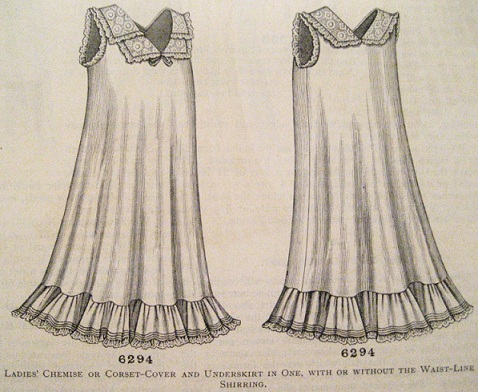
If you’re at all like most historical costumers, you tend to focus on the main part of a new costume – the dress. I know I do. Sure, you give a thought to the corset; maybe even make a new one which we know is the substance for a well-presented silhouette. Then you follow with thoughts of what to wear under that new corset.
Wouldn’t it be wonderful to have a closet full of ready-made chemise & drawers sets without having to worry about making them at the last minute?
If you desire well-made undergarments – rather than spend the money on some shoddy, tacky thing from a foreign vendor who doesn’t know a thing about historical fashion –look first to this list of available patterns then apply your own sewing skills for a project you can be proud of.
No more crappy underwear!
From time to time we all get distracted by the bulk work of the project, letting the “little things” like basic undergarments fall by the wayside. But protecting your beautiful corset and dress from normal sweat and body oils is crucial.
Use this list of the many patterns available for the most basic of period clothing pieces. Please note that this list is not exhaustive. For suggestions on fabrics for undergarments read this post.
Also, let’s support these independent pattern publishers so they will continue to make patterns we can use to support our CADD (Costumer’s Attention Deficit Disorder).
.
Links updated September 2021.
Truly Victorian – well designed and generally easy to follow; a favorite among historical costumers. Please tell Heather I sent you!
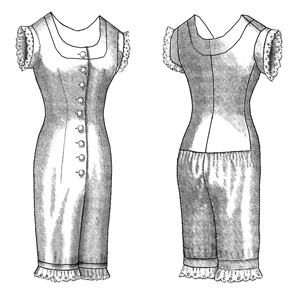
#TV102 Chemise & Drawers – one of the easiest patterns to sew up; quick & to the point; can be used as basic undergarments for Regency through Edwardian. I have a couple sets of these as my “every day” wear.
#TV106 1865 Chemise and Drawers – another great basic set that works for 1860s through 1890s.
Laughing Moon – JoAnn’s patterns are well done and full of additional information; a wide range of sizes are included
LM #100 Ladies Victorian Underwear – this is the pattern that includes her ever popular Dore & Silverado corset patterns. The chemise has nice styling.
Sense & Sensibility – Please tell Jennie I sent you! Easy patterns designed for the modern sewer.
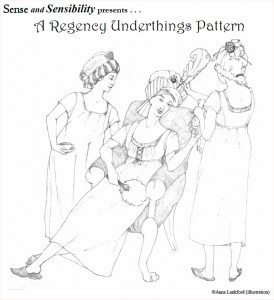
Past Patterns – generally well drafted with sources listed and other period information
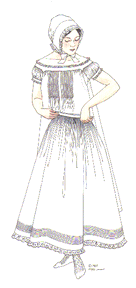
#002 Two Early Nineteenth Century Chemises – great for Regency, Romantic Era & Early Victorian
#706 1850s-1860s Drawers and Petticoat
Past Patterns – Out Of Print (but search for availability from other vendors)
#107 Two Edwardian Combinations
#117 Edwardian French Drawers
Country Wives (available at Wm. Booth Draper)
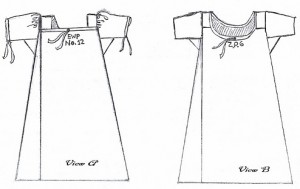
#CWSS-02 Country Wives’ Two Chemises 1805-07 (cutting diagrams only) – suitable for Regency through Romantic Era
Kannik’s Korner – great patterns with attention to historical accuracy (I have this one in linen for all my Regency & Early Victorian costumes.)
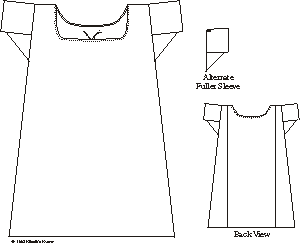
Period Impressions – can be hit or miss; fairly simple designs with basic instructions; pieces don’t always match or are cut differently than the drawing. Google search for vendors.
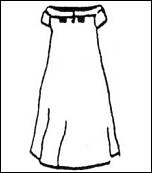
Lady’s Chemise
Mid Nineteenth Century Drawers
Empire Bodiced Underpetticoat
Mantua Maker – garment sketches lack imagination but the sewing instructions are full of helpful details; sizes tend to run on the small side
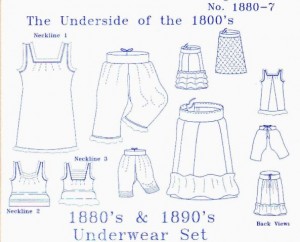
Follow this link for Mantua Maker patterns not linked below.
#1800-1: 1600 – 1840 Chemise Pattern
#1800-3: 1850 – 1890 Ball Gown Chemise Pattern
#1810-4: 1800 – 1830 Pantalettes Pattern
#1880-1: 1870’s – 1880’s Chemise Pattern
#1880-2: 1880’s – 1890’s Open Drawers Pattern
#1880-7: 1880’s – 1890’s Underwear Set Pattern
#1880-8: 1880’s – 1890’s Combinations Pattern
Buckaroo Bobbins – good patterns printed on newsprint paper. Their site had gone away for a while but is back. The patterns are still available from a variety of vendors so do a Google search.

Ageless Patterns – for those truly advanced; little or no sewing instructions; most traced straight off period diagrams and produced ‘as is’ with period sizing, although some patterns are now multi-sized
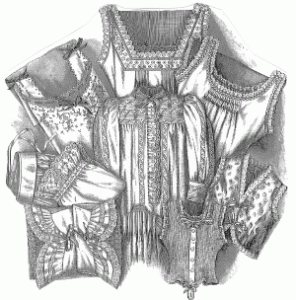
Follow this link for all Ageless patterns – look under “Undergarments.”
#1503: 1897 Ladies Undergarments
#1626: 1877 2 Ladies Chemises
#1627: 1877 Chemise Buttoned on the Shoulders
Simplicity – one of the “Big 4” commercial pattern lines
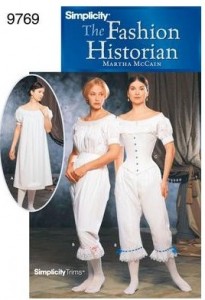
#9769 Mid-19th C./Civil War Chemise & Drawers (google for availability)
#2890 Civil War Corset, Chemise & Drawers (out of print but google it)
#7215 Civil War Chemise & Corset (out of print but google it)
Folkwear – decent patterns that produce period-esque garments
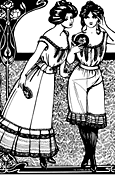
Harriet’s Patterns – not terrific patterns, but still options that are available
Follow this link and click on the time period you want.
21-L Day Chemise
22-L Evening Chemise
24B-L Civil War Drawers
24A-L Drawers, Late 1880s
Pattern resources from books
Period Costume for Stage & Screen: 1800-1909 by Jean Hunnisett – many basic and foundational patterns on grids
Voice of Fashion (1900-1905), Edwardian Modiste (1905-1909) and Fashions of the Gilded Age, Volume 1 (1877-1882) published by Frances Grimble – pattern diagrams from period sources that need to be drafted out with a specific ruler system (included in each book); a wide variety of garments to fill your costume closet
If you want something different try these here below. Most are either original patterns and/or available as pattern diagrams.
Elizabeth Stewart Clark – her free chemise and drawers patterns are simple PDF directions for drafting out patterns to your measurements. I’ve made the drawers (didn’t measure my fabric width first so make sure you do) and put in a front opening. But after wearing for years I’ve decided a back opening on drawers is so much better.
Both above links take you to the main Compendium page. Scroll down to Free Projects and Patterns section to find the PDF files.
Vintage Pattern Lending Library – these are original patterns that can be checked out (like a library) and some are available for purchase. Although you don’t really need to make a mockup of undergarments, being originals I would almost recommend a fitting session with these.
1860s Civil War Era Chemise Pattern from Peterson’s, December 1860 – an original diagram straight from a period magazine
What’s your experience been with any of these patterns? Do you have a favorite chemise or drawers pattern? Share your experiences below.

Looking for something that says AT LEAST how much fabric is needed for a simple corset cover…not exactly a chemisette because it isn’t meant to be seen. I’m making a late 19th century kit and can’t find any tutorials, patterns, ANYTHING about this small but important undergarment.
You might find my article on these undergarments helpful.
I am looking for a chemisette with a stand up collar pattern.. connecting with a button or tie..I would like it to go down and tie under the bust so it doesn’t move around a lot…anyone know where I can find this pattern
Hi Jean,
I don’t know of many chemisette patterns out there but this one from Truly Victorian TV104. (I can ship it to you from my Old Petticoat Shop.) There’s also four designs in the Janet Arnold Patterns of Fashion 1 book.
I am working on making my husband some historically accurate costumes. I would like to include underwear. Do you know of any companies that make patterns for different eras, both drawers and undershirts. Any help will be great.
There’s a few out there. Try this list of pattern makers: https://historicalsewing.com/patterns-for-well-dressed-19th-century-gentleman
I tried Laughing Moon’s underpinnings pattern LM 100, Ladies Victorian Underwear. I haven’t attempted the corsets yet, but I have a busk on order. The drawers are very simple and easy to do but the chemise is a prize pain with a lot of unnecessary fussiness. It looks great if you want to take the bother, but with so many other companies making chemise patterns with simple lines, that can be easliy decorated, well, I found it to be more bother than it was worth.
I am making #107 Past Patterns, combination Ladies’ Edwardian Costume, chemise and petticoat. Problem #1 – I don’t know if the picture from the front of the package is what I’m making, or if it’s the ones on the inside pattern pieces. They aren’t the same! Problem #2 – There is a side closure for the petticoat, but the chmise buttons up the middle (but they are attached). The directions are SO incomplete. What a frustration. These are for living history, and I have to make two more! Does anyone read this and help???
Did this pattern come with pictures included inside? I just got this pattern and it says fig 1 and such but there are not any figures included at all . Or as pictured. I’m stumped and have contacted the company I bought it from and they say they don’t see one in the one they have in stock. Mysterious!
Have you tried contacting Saundra, the owner, over at Past Patterns?
Hi Jennifer,
Just wanted to mention that Amazon Drygoods is still in business, and very helpful when I called. They offer an assortment of patterns and other supplies. A small company trying to make it. A mention of them, I know, would be appreciated.
Patricia
Yes, the new owners brought it back a couple years ago. I’ve had brief conversations with the owner – great service!
I’ve made the TV combo underwear several times, and the pattern and instructions are very easy (I’ve loved all the TV patterns I’ve tried, actually). I’ve made them in cotton gauze and fine linen. It’s absolutely worth it to make sure the top of the split crotch comes all the way up if you experience chub rub. it definitely reduces bulk under the corset, though i did have a couple of button impressions on my waist (I’ve mostly worn them under late 1880s bustle outfits- use only flat buttons, BTW, no shank!). i added an extra button in front of the crotch and over the butt for extra security (fear of going ass over tits while running around at an event) but don’t even do them up anymore as the overlap stays with no problem. For what it’s worth, the largest size will go up to 55″ bust and waist, 60-65″ hips before you have to add width to the garment.
Hi, I was wondering if you have any info on whether combinations were widely worn by 1883? I’m trying to decide whether I should do a chemise/petticoat combo or a combinations set for a middle-class girl in that year, and I know they are both accurate but I’m just wondering which is MORE accurate (because I think the combinations didn’t become the norm till 1890s but I’m not sure). 🙂 I knew very little about Bustle Era before visiting your site, it is very helpful!
I’m not sure something can be “more” accurate if it’s already being worn. Now, if it was more *common* – that I’m not sure of with combinations. We don’t see a ton of existing pieces but do see quite a bit of the separate chemise and drawers garments. If the number of surviving pieces is limited (they ARE around though) it could mean they were worn until they were no longer useful, or they simply were not as common as the two pieces. I know this gives you *SO* much more to go on… The separate garments would give you more leeway in dressing for other decades.
No, those were some other points I hadn’t thought of. Thank you for replying! 🙂
Thanks for mentioning my book The Voice of Fashion. I also put numerous patterns for undergarments into these books: Reconstruction Era Fashions, Fashions of the Gilded Age Volume 1, Bustle Fashions 1885-1887, Directoire Revival Fashions 1888-1889, and The Edwardian Modiste.
3 minutes ago · Like
Looking for “Corsets & Crinoline” book by nora wagh. It has a bustle pattern in it. went to my states (Calif) library and its not available, Does anyone have the instructions they could pass on to me to make this lobster tail bustle?
thanks to anyone who replies!
There isn’t really instructions in the Waugh book, just diagrams for pattern enlarging and text talking about the eras.
I have made the Sense & Sensibility chemise as well as the Folkware Edwardian underthings. Both a great patterns and go together really easily. My only quibble with the S&S is probably due to my wearing a strapless corset instead of my 18th century corset under my Regency dress. If the drawstring is low enough for an (in)decent evening decolletage, the sleeves have a tendency to slip down into your ballgown sleeves and peek out from under your fashion fabric. I prefer having no straps on my stays when I’m dancing, so I think I may just go ahead and make a non-period sleeveless chemise so I can loop the lingerie straps I sewed into my ballgowns through the shoulder straps of the chemise.
Timeless Stitches patterns are also very good.